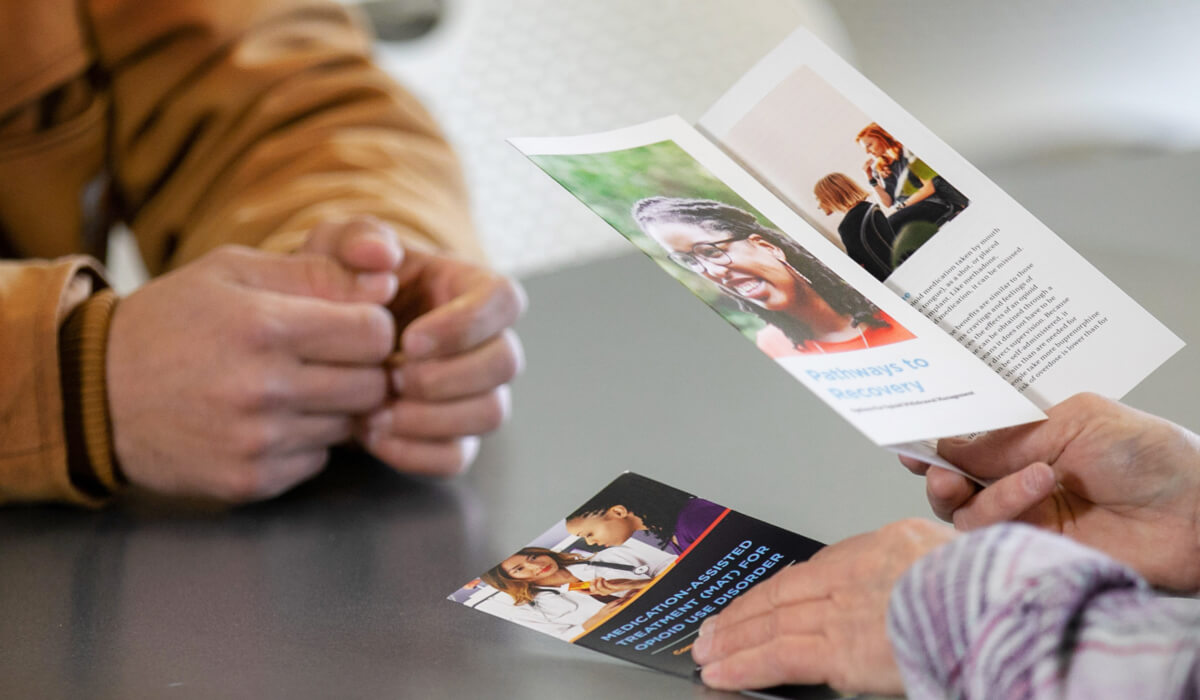
Opioid use disorder (OUD) has been an ongoing public health crisis in the United States for many years, and the Centers for Disease Control and Prevention (CDC) estimates that 136 people die every day from an opioid overdose.1 Even though the opioid crisis showed signs of slowing down in early 2020, the COVID-19 pandemic quickly reversed that progress. Drug overdose deaths soared during the pandemic, and opioid overdose deaths in the United States increased by nearly 30% between April 2020 and April 2021.2 The ripple effect from the opioid epidemic negatively impacts community health, eroding quality of life, economic opportunity, and family support.

Beacon Health Options associate Mary Jo Capitani shares information pamphlets on the Changing Pathways program.
A major challenge of the opioid epidemic is the reliance on traditional treatments, which have not been effective. The traditional, long-used “detox then recovery” approach puts up to 91% of people treated at high risk for another overdose.3 A promising alternative to this approach is the Changing Pathways program from Anthem’s Beacon Health Options, which leverages medications for opioid use disorder (MOUD) and peer recovery support to address the social and behavioral drivers of health to improve outcomes.
The Changing Pathways program begins when members are admitted to an inpatient facility for opioid use or another behavioral health disorder. At the facility, members receive educational material and medications for opioid use disorder. If they choose to continue the program, they begin treatment and can be transitioned to community providers for ongoing treatment support. There, they are matched with a peer specialist who provides additional support with the social aspects of recovery.
“Part of what I want to bring to the table is to offer a sense of hope,” said Mary Jo Capitani, a community peer specialist at Beacon Health Options. “I’m having conversations with members six months after they start the Changing Pathways program, and they are realizing they would never have been able to make these changes on their own if they hadn’t made this connection with Beacon and with me as a peer.”
Using medications to treat opioid use disorder represents a consequential practice shift as it involves using a modified version of the drug to treat the disorder, rather than entirely stopping use of the drug. When physical medical treatment is paired with social and behavioral support to address an individual’s whole health, outcomes improve.
“In the same way that we use medications to treat other chronic illnesses, such as diabetes or hypertension, we have medications that can help people with opioid use disorder recovery,” says Sandrine Pirard, M.D., Vice President and Medical Director for Beacon. “When coupled with peer support and appropriate follow ups, this treatment saves lives.”
Members engaged in the Changing Pathways program in Connecticut were 2.5 times more likely to adhere to their treatment for 90 days following discharge than people who went through traditional withdrawal management and later started medications for opioid use disorder. Members who continued their medications for opioid use disorder regimen had a 75% reduction in overdose rate on average in the 90 days after discharge compared with those who did not. The treatment is successful, though currently only 11% of people across the country with opioid-use disorder are using medications.4 It is imperative that more people have access to this treatment, and Anthem has made it a priority for both our government and commercial businesses.
The ongoing challenge of opioid use disorder has required a new approach to treatment and recovery, as well as partnering with providers to advance best practices. In creating Changing Pathways, Beacon has reimagined the system into one that helps more individuals and communities achieve better health outcomes.
The Connecticut Behavioral Health Partnership (CT BHP) is a partnership between the CT Departments of Social Services, Mental Health and Addiction Services, and Children and Families. Beacon serves as the Administrative Service Organization. Partnerships with several facilities in the CT BHP made Changing Pathways possible, including Rushford (Hartford Healthcare) and Intercommunity, Southeastern Council on Alcoholism and Drug Dependence (SCADD), and inpatient psychiatric units at Saint Francis Hospital (Trinity Health) and the Institute of Living (Hartford Healthcare).

